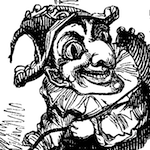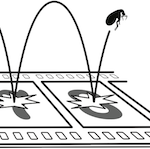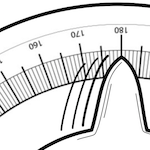|
John D. Norton
Thought Experiments
|
|
home >> research
>> thought experiments |
|

|
How do thought experiments give us knowledge of the world? Many
suppose that there is some special sort of epistemic power inherent
in thought experiments and that they may even open windows through
which we can perceive the Platonic forms of the laws of nature
themselves. In a series of studies, I have defended a deflationary
account of the nature of thought experiments: they are merely
picturesque arguments, I say, and have no special epistemic powers
beyond those of ordinary argumentation. |
"Thought Experiments in Einstein's Work," in Thought
Experiments In Science and Philosophy, eds. T. Horowitz, G. J.
Massey, Savage, MD: Rowman and Littlefield, 1991. Download.
"Are Thought Experiments Just What You Thought?" Canadian
Journal of Philosophy, 26, pp. 333-66. Download.
"Seeing the Laws of Nature" Metascience, Issue 3 (new
series), 1993, pp. 33-38. (Review of
James R. Brown, The Laboratory of the Mind: Thought
Experiments in the Natural Sciences. London: Routledge,
1991.) Download.
"Why Thought Experiments Do Not Transcend Empiricism" pp. 44-66 in
Christopher Hitchcock (ed.) Contemporary Debates in the
Philosophy of Science. Blackwell. Download.
"On Thought Experiments: Is There More to the Argument?" Proceedings
of the 2002 Biennial Meeting of the Philosophy of Science
Association, Philosophy of Science,71 (2004) pp.
1139-1151. Download.
"Chasing the Light: Einstein's Most Famous Thought Experiment,"
Thought Experiments in Philosophy, Science and the Arts, eds., James
Robert Brown, Mélanie Frappier and Letitia Meynell, New York:
Routledge, 2013. pp. 123-140. Download.
"Chasing the Light: Einstein's Most Famous Thought Experiment." in Goodies.
"What is the Lift of an Infinite Helicopter Rotor at Rest?" in Goodies.
"Ethics of Imaginary Research" in Goodies. |
|
|
 |
Narrative conventions in a thought experiment allow thought
experimenters great latitude in deciding which processes are typical
and bear generalization and which can be idealized away as
incidental. Misuse of this latitude has allowed one particular
thought experiment to be responsible for many decades of confused
science. |
"The Worst Thought Experiment," The Routledge
Companion to Thought Experiments. Eds. Michael T. Stuart,
James Robert Brown, and Yiftach Fehige. London: Routledge, 2018. pp.
454-68. Download. |
 |
An infinite lottery machines chooses without favor among a
countable infinity of outcomes. This sort of selection creates
well-known problems for probability theory. But is it really
physically possible to construct such a machine?. |
"How to Build an Infinite Lottery Machine" 8
(2018), pp. 71-95.
(with Alexander R. Pruss) Correction to John D. Norton “How to Build
an Infinite Lottery Machine, ” European Journal for Philosophy
of Science. 8 (2018), pp. 143-44.
Download. |

|
All efforts to design an infinite lottery machine using ordinary
probabilistic randomizers fail. This failure is not a result of a
lack of imagination in design. It is assured by a familiar problem
in set theory: we know no way to construct probabilistically
nonmeasurable sets. |
"How NOT to Build an Infinite Lottery Machine." Studies
in History and Philosophy of Science. 82(2020),
pp. 1-8. Download. |
|
|

|
Ready for a little light entertainment? What happens if one asks
whether an infinite tower of turtles could overcome gravity and
support the world? What happens if we ask if there is some mechanism
in ordinary Newtonian mechanics that would let a castle float in the
air. |
"Turtles
all the way down."
Castles in the air. |
|
|




